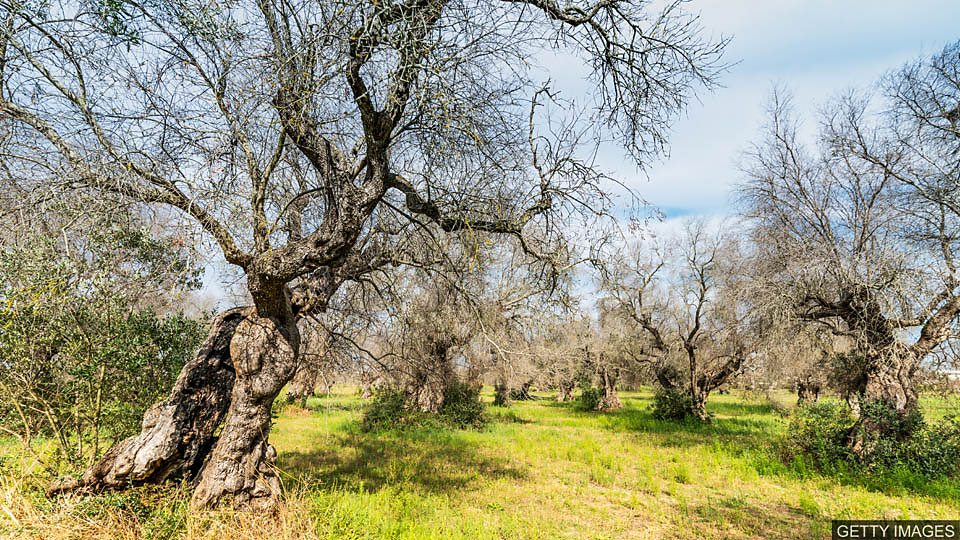研究人员表示,一种致命病原体对欧洲橄榄树的侵害所造成的经济损失可达200多亿欧元。研究人员模拟了这种名叫叶缘焦枯病菌(Xylella fastidiosa)的病原体未来的最坏影响,这种病原体已经杀死了意大利的大片树木。
Xylella is considered to be one of the most dangerous pathogens for plants anywhere in the world. Transmitted by sap-sucking insects, the bacterium has caused Italy’s olive production to decline by 60% since it was first discovered in 2013. The infection has now been found in trees in Spain, France and Portugal.
叶缘焦枯病菌(Xylella)被认为是世界上最危险的植物病原体之一。这种病菌通过吸吮植物汁液的昆虫传播,自2013年首次发现以来,已导致意大利橄榄产量下降了60%。现在, 在西班牙、法国和葡萄牙的树木中也发现了这种病菌感染。
As there are no treatment at present, researchers modelled what would happen if olive trees were wiped out across major producing countries. They suggest that the economic cost to Europe would be in excess of €20 billion, with likely shortages and price increases for consumers of olive oil.
由于目前还没有治疗方法,研究人员模拟了如果橄榄树在主要生产国全部死亡后会发生的情况。他们认为,欧洲的经济损失会超过200亿欧元,包括消费者可能面临橄榄油短缺和价格上涨。
The researchers say that the best hope of avoiding the drastic scenario is to develop resistant varieties of olive trees. While this approach may be slow, the authors say, it’s by far the best option in the long run.
研究人员表示,避免这种极端状况的最大希望是开发出抗性品种。虽然这个方法可能很慢,但此研究的作者们说,从长远来看,这是目前最好的选择。
词汇
pathogens 病原体
transmitted 被传播
sap-sucking 吸取(植物)汁液的
bacterium 细菌(单数)
infection 感染
wiped out 完全毁灭、死亡
shortages 短缺
drastic 极端的
resistant 具有抵抗力的
varieties 不同的品种
in the long run 从长远来看
阅读理解:请在读完上文后,回答下列问题 。
1. True or false? The infection of Xylella has been found in trees in several countries in Europe.
2. How is Xylella transmitted?
3. What would be the economic cost to Europe if olive trees were wiped out across major producing countries?
4. What is the best option for avoiding the trees being wiped out by the disease, according to researchers?
答案
1. True or false? The infection of Xylella has been found in trees in several countries in Europe.
True. The infection has now been found in trees in Italy, Spain, France and Portugal.
2. How is Xylella transmitted?
Xylella is transmitted by sap-sucking insects.
3. What would be the economic cost to Europe if olive trees were wiped out across major producing countries?
Researchers suggest that it would be more than €20 billion, with likely shortages and price increases for consumers of olive oil.
4. What is the best option for avoiding the trees being wiped out by the disease, according to researchers?
According to researchers, the best hope of avoiding the drastic scenario is to develop resistant varieties of olive trees.


 3342次下载
点击下载
3342次下载
点击下载
 2621次下载 点击下载
2621次下载 点击下载
 4734次下载 点击下载
4734次下载 点击下载
 1854次下载 点击下载
1854次下载 点击下载
 1391次下载 点击下载
1391次下载 点击下载
 1391次下载 点击下载
1391次下载 点击下载











